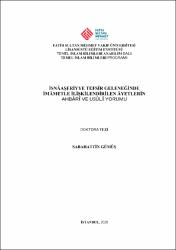| dc.contributor.advisor | Arslan, Ahmet Turan | |
| dc.contributor.advisor | Gökkır, Necmettin | |
| dc.contributor.author | Gümüş, Sabahattin | |
| dc.date.accessioned | 2020-08-28T08:50:29Z | |
| dc.date.available | 2020-08-28T08:50:29Z | |
| dc.date.issued | 2020 | en_US |
| dc.identifier.citation | GÜMÜŞ, Sabahattin, İsnâaşeriyye Tefsir Geleneğinde İmâmetle İlişkilendirilen Âyetlerin Ahbârî ve Usûlî Yorumu, Fatih Sultan Mehmet Vakıf Üniversitesi Lisansüstü Eğitim Enstitüsü Temel İslam Bilimleri Anabilim Dalı, Yayımlanmamış Doktora Tezi, İstanbul 2020. | en_US |
| dc.identifier.uri | https://hdl.handle.net/11352/3130 | |
| dc.description.abstract | Bu çalışmada İsnâaşeriyye mezhebinin iki düşünce ekolü Ahbârîlik ve Usûlîlikte imâmetle ilişkilendirilen âyetlerin nasıl tefsir edildiği ve ilgili âyetlere bu iki ekol tarafından yapılan yorumlar arasındaki farkın ortaya konulması amaçlanmıştır. Çalışma, mukâyeseli ve tasvîrî (deskriptif) metin analizi yöntemiyle oluşturulmuştur.
Çalışmada ister ilk dönem ister yeni dönem olsun, Ahbârîliği ortaya çıkaran temel unsurun, İsnâaşeriyye rivâyet edebiyatında imamlara nisbet edilen haberler ile haberlerde dinî ve dünyevî işlere ilişkin onlara biçilen rollerin olduğu kanaatine varılmıştır. Kur’ân’ın tahrif edilip değiştirildiğinin, Ahbârîlerin hemen hemen tamamı tarafından şiddetle savunulduğu görülmüştür. Ahbârîlerin savundukları “Kur’ân’ın tahrifi” meselesi ile “imâmet” teorisi arasında sıkı bir bağ olduğu ortaya çıkmıştır. Buna karşılık birçok Usûlînin, Kur’ân’ın tahrif edilmediğini ifâde ettiği tespit edilmiştir. Ancak Usûlîlerden Ahmed en-Nerâkî tahrifi savunmuştur. Kur’ân’ın tahrif edilmediğini ancak âyetlerin tefsiriyle ilgili Allah Resûlü’ne (s.a.s.) açıklamaların vahyedildiğini ve bunların Hz. Ali’nin mushafında bulunduğunu ileri süren Usûlîlerden Şeyh Müfid’in, yaptığı bu yorumla hem Kur’ân’ın tahrif edilmediğini hem de İsnâaşeriyye rivâyet edebiyatında Kur’ân’ın tahrifini belirtenveya hissettiren onlarca rivâyetin Kur’ân’ın tefsiri kabîlinden olduğunu söyleyerek bu iki meseleyi telif etme yoluna gittiği anlaşılmıştır.
Ahbârî müfessirlerin, imamlardan nakledildiğini ileri sürdükleri rivâyetler aracılığıyla bazı âyetleri Ali Şîası’yla ilişkilendirdikleri halde birçok Usûlî müfessirin bunları onlarla ilişkilendirmediği tespit edilmiştir.
Ahbârî müfessirlerin, imâmetin anlatıldığına inandıkları birçok âyetin sahâbîleri hedef aldığını ve onlar hakkında indiğini ileri sürdükleri farkedilmiştir. Buna karşılık ilgili âyetleri, Usûlî müfessirlerin genelinin onlarla ilişkilendirmedikleri ve âyetleri öncesi ile sonrasını göz önünde bulundurarak siyâkın gerektirdiği şekilde açıkladıkları görülmüştür.
Diğer yandan Ahbârîlerin, Kur’ân’da sahâbîlerin üstünlüklerinin anlatılmadığını düşündükleri anlaşılmıştır. Usûlî müfessirlerin de bu hususta aynı kanaatte oldukları söylenebilir.
Ahbârîler ve Usûlîler imâmeti ispatlamak için Kur’ân’ı referans olarak gösterse de buna ilişkin öne sürdükleri âyetlerin sayısı ve tasnîfi açısından iki ekol arasında farklılık olduğu gibi Ahbârîlerin, ilgili âyetleri açıklarken bâtıni anlama yoğunlaştığı, buna karşılık Usûlîlerin zâhiri anlama odaklandığı ortaya çıkmıştır. | en_US |
| dc.description.abstract | In the present study, my aim is to demonstrate how the verses associated with Imamate (leadership of the Ummah) are interpreted in the two schools of thought within the Ithnaashariyyah; Al-Akhbariyyah and Al-Usuliyyah and to put forward the differences between these two schools employing the comparative-descriptive textual analysis method.
I have reached the conclusion that the basic factor that brought about Al-Akhbariyyah either in the initial years of this thought or in the modern times, was the narratives attributed to the imams in the narration literature of the Ithnaashariyyah and –as a result of this- the roles they been assumed to have in the secular and religious matters. I have observed that the claim of distortion of the Qur’an was fiercely supported by almost all of Al-Akhbariyyah. And there was a strong association between the claim of distortion of the Qur’an and the theory of Imamate, both supported by Al-Akhbariyyah. I have also found out that many members of the school of Al-Usuliyyah expressed that the Qur’an was not distorted. However Ahmad Al- Naraqi, one of the Usulis, supported the distortion claim. On the other hand, Sheikh Mufid, of the school of Al-Usuliyyah, claimed that The Qur’an was not distorted but the explanations related to the interpretation of the verses were revealed to the Messenger of Allah (PBUH) and these explanations were existent in the copy of Ali The Exalted. He also claimed that tens of narratives implying that the Qur’an was distorted were actually referring to the interpretation of The Qur’an, and sought to reconcile these two different outlooks.
I have realized that even though Al-Akhbariyyah commentators of The Qur’an associated some verses with The Shia of Ali based on the narratives they attributed to the Imams, many Al-Usuliyyah commentators did not associate these verses with them.
I have noticed that Al-Akhbariyyah commentators claimed that many verses believed to talk about Imamate targeted the Companions and were revealed about them. In contrast to this, Al-Usuliyyah commentators generally did not associate the verses with them and interpreted these verses by considering the preceding and following verses pursuant to the methodology of seyaq.
It was understood that Al-Akhbariyyah thought that the superiority of the Companions was not narrated in the Qur’an. It can be said that Al-Usuliyyah commentators have a similar stance on this issue. Even though Al-Akhbariyyah and Al-Usuliyyah referred to the Qur’an for proving the Imamate, there are differences between the two schools in terms of the numbers of the verses they brought forward and the classification of the verses; and it was found out that while Al-Akhbariyyah leans towards the batinî approach, Al-Usuliyyah mostly prefers zahiri approach in the interpretation of the verses. | en_US |
| dc.language.iso | tur | en_US |
| dc.publisher | Fatih Sultan Mehmet Vakıf Üniversitesi, Lisansüstü Eğitim Enstitüsü | en_US |
| dc.rights | info:eu-repo/semantics/openAccess | en_US |
| dc.title | İsnâaşeriyye Tefsir Geleneğinde İmâmetle İlişkilendirilen Âyetlerin Ahbârî ve Usûlî Yorumu | en_US |
| dc.title.alternative | The Akhbari and Usuli Interpretation of the Verses Associated With Imamate in the Tradition of Ithnaashariyyah Interpretation | en_US |
| dc.type | doctoralThesis | en_US |
| dc.contributor.department | FSM Vakıf Üniversitesi, Lisansüstü Eğitim Enstitüsü | en_US |
| dc.relation.publicationcategory | Tez | en_US |
| dc.contributor.institutionauthor | Gümüş, Sabahattin | |



















